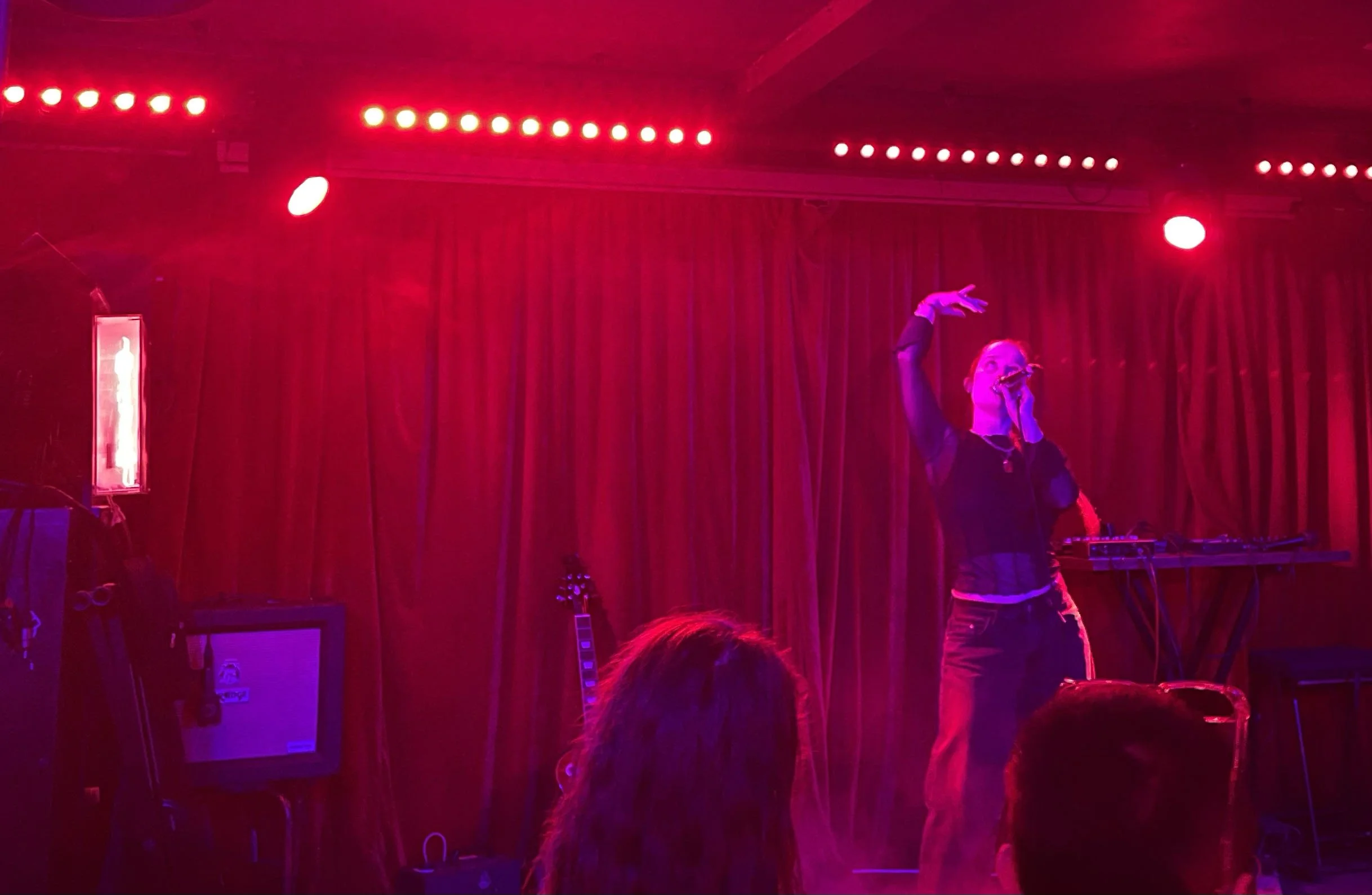Celebrating Emerging Talent in Hackney
Words by Tanya Fevzi
From the outside of Paper Dress Vintage on a Tuesday night, there doesn’t seem to be much going on inside. Through the glass window, a dim light softly illuminates rails of vintage garments, ready to be rummaged through tomorrow. Yet, the smiling security guard who gestures for my ID and a peek into my tote bag suggests there is more than meets the eye.
I walk through to the back of the store and climb the stairs, from where a rumble of voices and a mellow soundtrack greet me. It’s Hackney’s iconic venue – vintage store by day, event space by night – and I immediately notice the house-party feel with the warm lighting, small kitchen bar setup and music that isn’t competing with conversation.
I’m met by Mei, one of the event organisers from Watchmegrowin management, an organisation that is helping queer artists navigate the industry, who I’d spoken to over email. You must be SISTA magazine, they say warmly, inviting me into the space and offering a drink token. I’d missed the first act – London-based pop and soul singer-songwriter Sofia Gillani – but I heard several times throughout the night that she’d brought her bold and invigorating avant-garde pop sounds to the stage, confidently setting the tone for the night.
Mei expressed their joy in the crowd that had formed in the intimate venue. A big part of the event was to bring emerging creatives together, and many had come alone, finding themselves a welcoming community to fall into. It was a space that didn’t have the capacity to alienate; each corner of the room was alive with conversation and immersion in the music. Mingling felt natural, and throughout the night, the supportive networking in the room was heartwarming. The venue is, ultimately, a grassroots space for emerging artists, and the genuine support in the room reflected this.
After a short artist changeover, attention drew back to the stage and Southeast Londoner Maphe was in the spotlight. Her ability to mesmerise was immediate, and her queer indie pop artistry marked the stage with raw and emotive songwriting, exploring themes of anxiety, OCD, and the complexities of romance. The room was filled with her dreamy yet introspective aura, permitting us all to be vulnerable in her presence.
After beginning her set with slower songs, she steadily built up to sounds that were bouncy and playful, and the crowd danced accordingly. A standout track was ‘insecure,’ which felt like a blend of SYML’s vulnerability and Halsey’s emotional edge.
The final changeover brought British-Turkish pop singer NOX to the stage, continuing the celebration of fresh talent. The self-proclaimed ‘Turkish Delight,’ who gained recognition for her debut single ‘Sun Goes Down,’ brought her experimental sounds and high-energy tracks to the vintage-store-turned-music-venue. On the stage with her producer FHUR, the pair engaged the crowd effortlessly, their synergy a seamless conversation between voice and beat. NOX commented on her tendency to write lyrics centring those deep and obsessive feelings that toxic relationships breed, and her music certainly had a gorgeously dark tone. During her track ‘X,’ she invited the crowd to think of their exes and sing with her, just another ex. At the end of the set and with the night coming to a close, the crowd pleaded for one more song, and NOX delivered a second rendition of ‘Girl Before.’ I would have loved to hear some of the artist’s Turkish songs and hope to see these performed at future concerts.
After NOX left the stage, there was an unwillingness from the crowd to end the night. We hovered over conversations about personal creative projects and continued to connect. After approaching Maphe with congratulations on her set, she credited the event organisers for giving her the platform to perform. She touched on the controversial nature of ‘pay-to-play’ or ‘bring-a-crowd’ gigs, which allow promoters to take advantage of emerging artists. These types of gigs, often in grassroots or independent scenes, come with the expectation that artists sell a certain number of tickets. If they don’t sell enough, they’re expected to pay the shortfall, and no profit is made. Instead, exposure and networking are offered as the reward, but this isn’t sustainable for artists trying to build a career around their music. Maphe mentioned that she had fallen into events with these terms a fair few times, but felt grateful to be performing at an event like The Chart, which was hosted by organisers who are aware of unfair treatment in the industry and instead want to empower artists and advocate for fairness.
The event was a huge success, running seamlessly from start to finish. The intimate, iconic venue added a special charm, while the crowd radiated a welcoming, close-knit community vibe. The live sets were raw and immersive, and each artist who performed showed an exciting, bursting potential that I can’t wait to see unfold.
